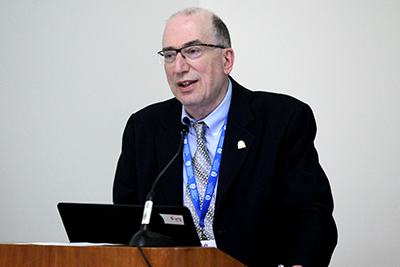Expert Shares Guidance on Prescribing Medicinal Marijuana to Avoid Legal Snags

Twenty-nine states and the District of Columbia have legalized medical cannabis, so psychiatrists throughout the country are or could be involved in prescribing marijuana to patients. To give mental health professionals a little preparation, APA hosted a session on medicinal cannabis and what psychiatrists need to know at its 2017 Annual Meeting.
One of the first important distinctions, noted David Gorelick, M.D., Ph.D. (pictured above), a professor of psychiatry at the University of Maryland, is that psychiatrists or other physicians cannot technically prescribe this drug to patients. Cannabis is still classified as a Schedule 1 controlled substance (risk of harm and no medicinal value) by the Federal Controlled Substances Act, which dictates which drugs can or cannot be prescribed for medicinal purposes, Gorelick explained. What physicians can do is “recommend” or “certify” marijuana use to patients.
Another factor of which psychiatrists should be aware is whether marijuana is available in their home state. “Just because a state has passed a law approving medicinal cannabis, it does not mean it is dispensing it,” he said. He used his home state of Maryland as an example: A law was recently passed in Maryland, but questions concerning who can dispense medicinal marijuana are tied up in the court system.
Kevin Hill, M.D., an addiction psychiatrist at McLean Hospital in Boston, discussed the current state of the science related to medicinal cannabis as well as related compounds like synthetic cannabinoids—including the only two FDA-approved medications from the cannabis family, dronabinol and nabilone. They are both approved for nausea related to cancer therapy and appetite stimulation for people with a wasting illness.
Beyond those two indications, Hill highlighted recent analyses including a 2017 report by the National Academies of Science, Engineering, and Medicine that support the efficacy of cannabis in treating chronic pain, neuropathic pain, and spasticity in multiple sclerosis.
“There is a big difference, though, between what the science says and what the laws says,” Hill said.
The laws vary from state to state regarding the medical conditions approved for cannabis therapy, but those for chronic diseases including cancer, HIV/AIDS, glaucoma, and Parkinson’s disease are fairly universal. In one state, at least 53 conditions and disorders are listed; these include several psychiatric disorders like depression, anxiety, and posttraumatic stress disorder. In some cases, ambiguous language opens the door to even more potential medicinal applications. In Massachusetts, for example, eight official debilitating disorders are listed as approved for treatment with cannabis, but the law also includes the language “… or other conditions as determined in writing by a physician.” An investigation done by The Lowell Sun found that in 2015, 22,000 out of 25,000 medical cannabis certifications were for these other conditions.
“It speaks to the case that we need good, randomized studies to keep pace with the policy,” Hill said.
John Halpern, M.D., director of the Boston Center for Addiction Treatment, provided a checklist of important "to dos" when a psychiatrist is ready to certify or recommend cannabis for a patient. There are many factors to consider for a plant-based medicinal whose legal status is different from state to state.
He stressed that written informed consent is paramount, and that patients should assure providers that they will keep a regular appointment schedule, keep a log of cannabis intake, and submit to urine screening if requested; failure to take these steps could result in a loss of the prescription. Providers should also emphasize that patients should not travel with their cannabis to other states where cannabis is not legal. Patients are also required to have lockable storage for their cannabis and keep it out of sunlight since sun exposure can oxidize the cannabis and change its properties.
Dosing is also a difficult proposition, since one cannot prescribe pills with a preset drug potency. Halpern said that vaporization/volatilization of cannabis is preferred to smoking or edible forms to get a therapeutic dose without potential adverse effects. Strong versions like hashish should be avoided, especially in people who are drug naïve. “And I would absolutely recommend that patients have a nonusing support person with them.”
(Image: David Hathcox)
|
|
|
|
|


